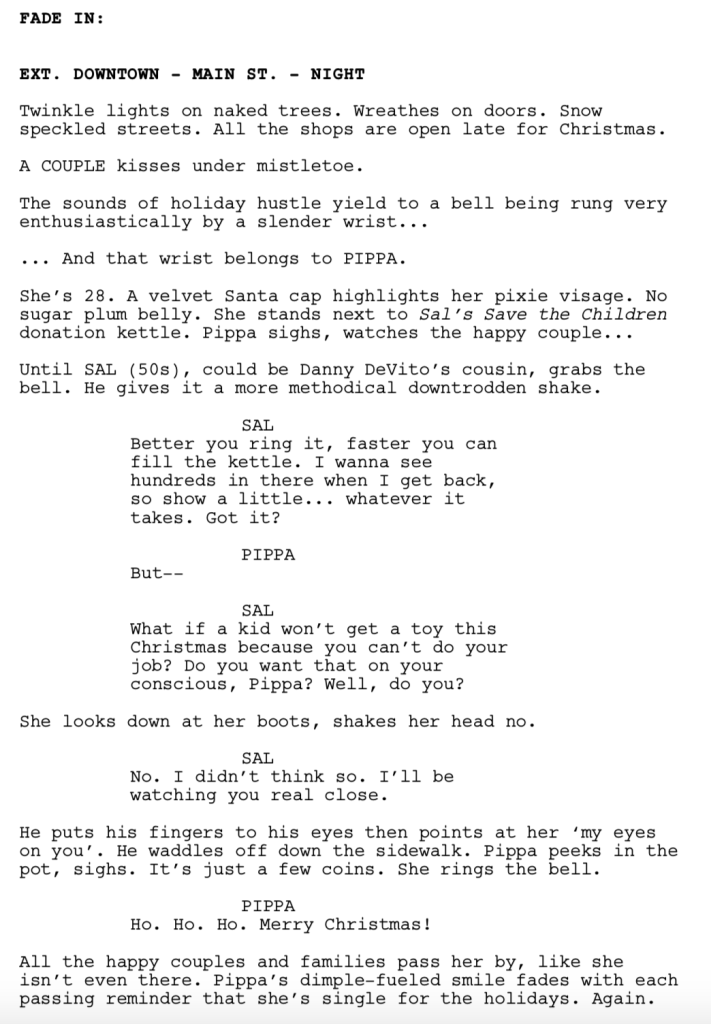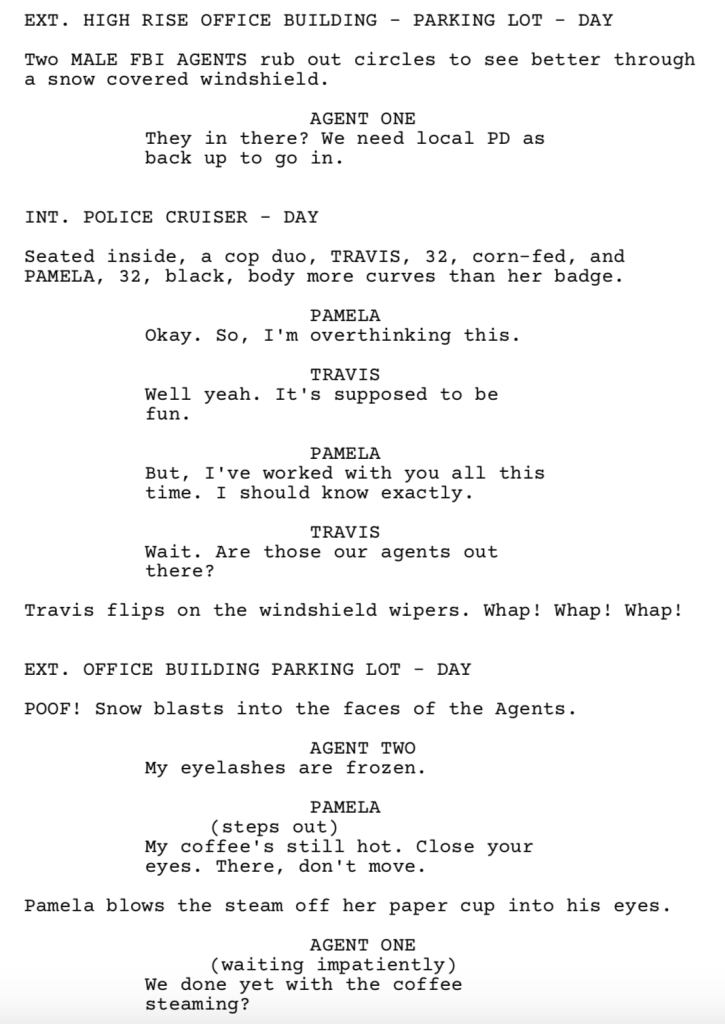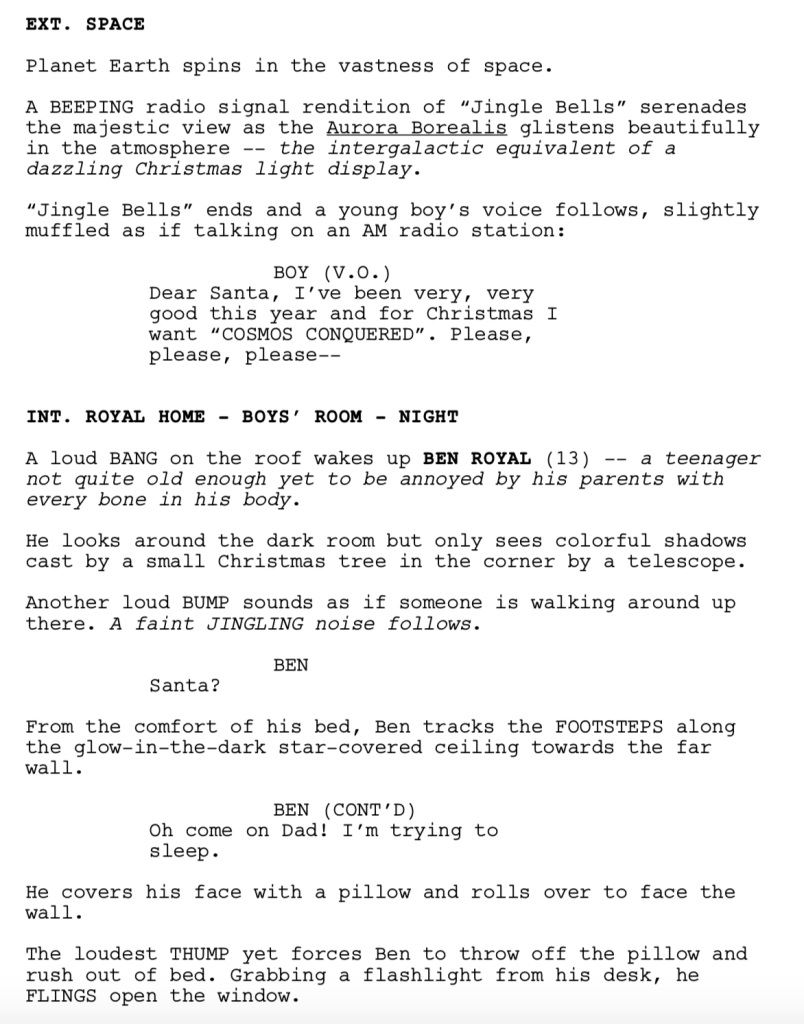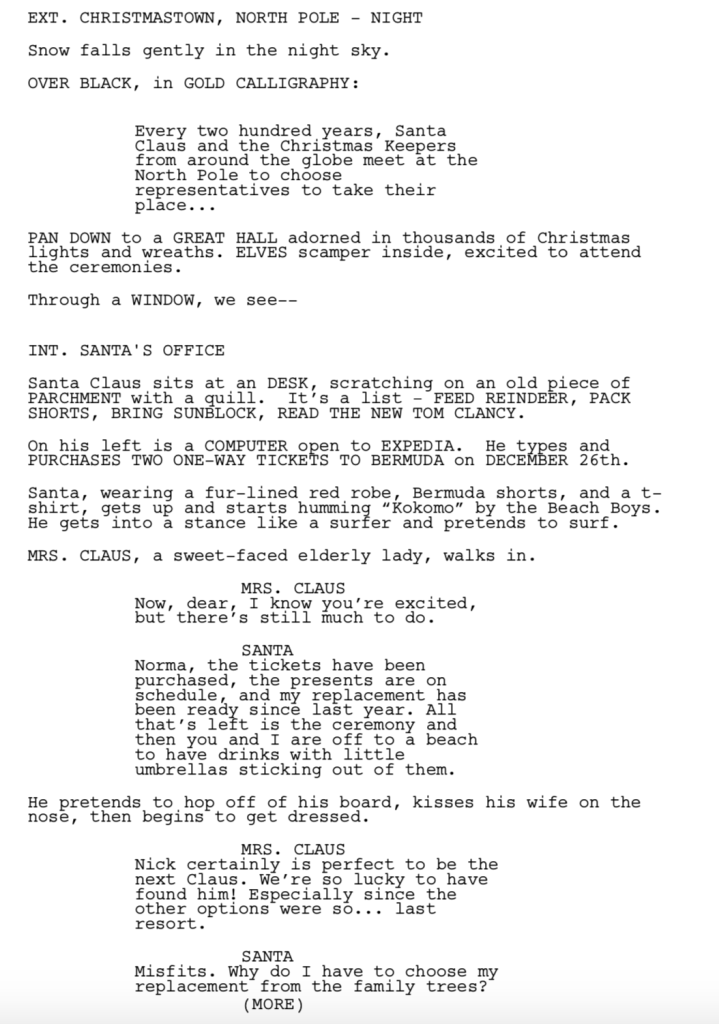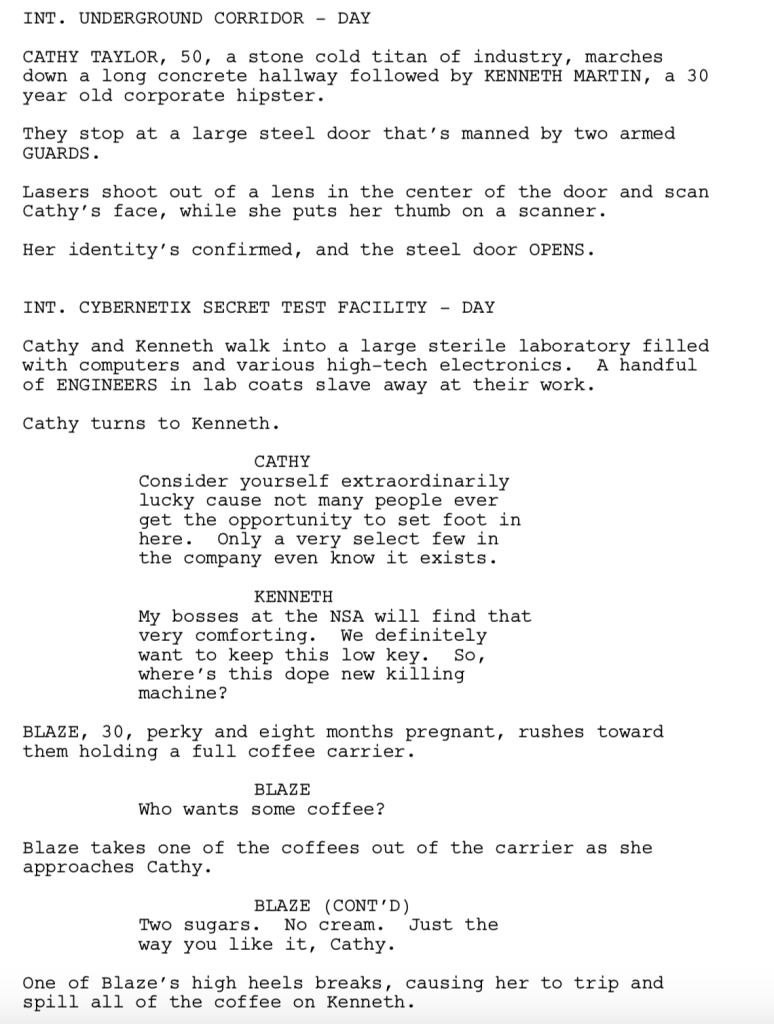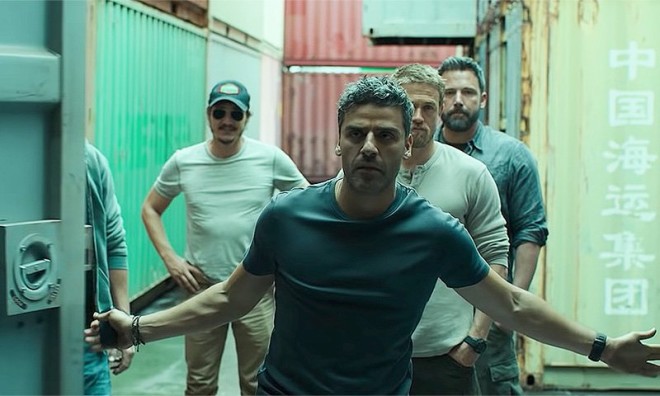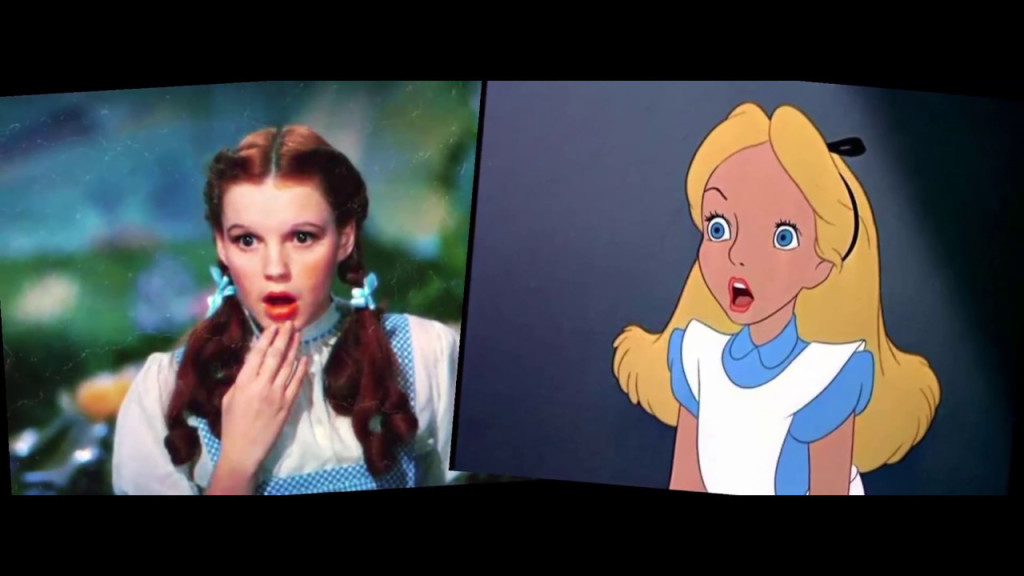That most merry of times is finally here. I asked for your holiday scripts and YOU DELIVERED. While there weren’t as many entries as the Halloween Amateur Offerings, there were a lot more than I thought there’d be. Hell, I even received a script from a reindeer (no seriously, a reindeer submitted an autobiographical screenplay). This means, unfortunately, Ebereeveser Scrooge cannot post them all. It doesn’t mean I don’t love you. It doesn’t mean you aren’t in my Christmas dreams. Only that your holiday script must live to fight another Christmas. Hey, what did our parents used to tell us whenever we asked for that expensive present? “You don’t always get what you want.”
Not to worry, though! For those who didn’t make it, I have good news. One of the first contests of the new year will be the “First Ten Pages Challenge.” I was reading a script the other day and I realized something. Too many screenwriters take script pages for granted. They think that as long as there’s an approximation of a story moving forward, the reader “owes” it to them to keep reading until they get to “the good part.” That’s not how the real world works, homie. In the real screenwriting world, you have to write a script that if you were to rip that script away from the reader as they were reading it, they would become furious and demand the script back. I don’t think writers write like that. They write like, “Ohh, I’ll have my cool little plot point on page 20 and in the meantime I’ll do a slow burn and set things up…” The Ten Page Challenge is designed to make you write a first 10 pages SO GOOD, that the reader would get physical if you tried to stop them from reading. So get started. I’ll have more on this once the new year starts.
For those who don’t know how Amateur Offerings works, it’s as simple as hanging a stocking. All you have to do is read as much of the 5 screenplays below as possible and vote for your favorite in the comments section. Voting closes on Sunday night, 11:59pm Pacific Time. Winner gets a review next Friday. — If you’d like to submit your own script to compete in Amateur Offerings, send a PDF of your script to carsonreeves3@gmail.com with the title, genre, logline, and why you think your script should get a shot.
P.S. Review of Spiderverse on Monday. Go see it so you can participate in the discussion!
Title: TAKING XMAS
Genre: Romantic Comedy
Logline: After bluffing her way into a repo job, a single girl must repossess the prized roadster of the town’s most eligible and dysfunctional bachelor before Christmas.
Why You Should Read: Since 2013, the Hallmark Channel has tripled the amount of original Christmas movies they produce each year (12 to 36). Couple this with the runaway success of “The Christmas Chronicles” on Netflix (20 million views opening week) and it’s clear there’s a family friendly holiday-themed path to breaking into the industry. Even one of our very own from Scriptshadow is a co-producer on “I’ll be Next Door for Christmas”, which is kicking butt on Amazon Prime as I type! It’s my Christmas wish to have the SS faithful help me and my co-writer thread this proverbial marketing needle with their insights. Thanks so much for taking any time you can spare during the busy holiday season to check out our script!
Title: SECRET SANTRESS
Genre: Comedy
Logline: The wife of a cop fears some conspiracy is brewing around the department’s “Secret Santa” gift exchange when her husband’s name is pulled by all his female co-workers.
Why You Should Read: It’s “Girls Gone Wild” meets “Murder She Wrote” meets every sappy Christmas movie you ever saw. In the spirit of Christmas we present this unabashedly irreverent and pull at the heartstrings swipe at all that embodies Christmas tradition, gift giving and grief. We’ve aimed for that vision of Christmas morning after the gifts have all be unwrapped. Just kick the trash under the tree and have another spiked eggnog. Hope you enjoy!
Title: NORTHERN LIGHTS
Genre: Science Fiction
Logline: When aliens attack a small town on Christmas Eve, a conservative yet strained family is forced to fight for their survival while also dealing with their different beliefs — or lack thereof — head on.
Why You Should Read: “INDEPENDENCE DAY” at Christmas time is the quick pitch… but beyond that, the heart of the story is inspired from my own childhood growing up in a conservative home that absolutely refused to accept the idea that aliens could be real as it would completely negate the “Nativity” message, yet the idea of believing in Santa Claus was joyfully encouraged. (An irony that I definitely didn’t understand as a child.) I wanted to create a potential family friendly holiday blockbuster that tackles how the “greatest time of the year” brings both discussions and family problems to the forefront, all while being backdrop to a simple story of a family trying to survive an alien invasion.
Title: Christmas Academy
Genre: Holiday Comedy
Logline: When Santa Claus’ protégé is killed in an avalanche, the next relative in line, a New York cop with no holiday spirit, is taken to the North Pole for his training until he must save Christmas from the grinch-like Krampus.
Why You Should Read: Apart from this script placing in the finals of both the Fresh Voices and Studio 32 screenplay competitions. It is a fresh new take, from two hungry writers, into the mythology of how to become the father of Christmas. It’s nostalgic, comedic and downright magical.
Title: Droid Rage
Genre: Holiday Action Comedy
Logline: A mild mannered android salesman is forced to team up with his trainwreck of a sister-in-law after they become the target of a top secret android killing machine.
Why You Should Read: Planes, Trains and Automobiles meets The Terminator, that’s what we’re dealing with here. Droid Rage has got it all, big set pieces, quirky characters, Santa, and a pregnant android killing machine. And the beauty is that it’s all wrapped up in an elegantly crafted three act structure. We’ve got big ass goals, huge stakes and shitload of urgency. Some people say Hollywood comedies are dead and those people can go suck a big long candy cane cause once Droid Rage hits the scene the only thing Hollywood will want to make are holiday themed action comedies. Here are some quotes from people that have read it, “twice as good as the bible” “you’ll never look at pregnant women the same again” “I shit my pants, but it had nothing to do with your script. I think it was from something I ate at Zankou Chicken.” Move over Die Hard cause there’s a new Christmas classic in town, and thy name be Droid Rage. So if you want to make $10,000 a month only working part time, if you want to meet that special someone, or if you’re just waiting for speed weed to drop off your dope and you’ve got an hour to kill this the script for you. Thank you for your time and consideration. Sincerely, The motherfuckers that wrote Droid Rage.

It’s time for my top ten amateurs scripts of the year! There’s a small caveat. A few consultation scripts which would’ve made the list are being kept off at the writers’ request. But don’t let that get you down. It just means more slots for Amateur Offerings scripts! Now none of these scripts are perfect. Hell, none of the professional scripts from yesterday were perfect. These are amateur writers which means they’re still learning. With that said, there’s promise in each and every one of these screenplays. Which is why I’m drawing attention to them. Let’s take a look. And don’t forget to share your own favorite amateur screenplays in the comments section.
Number Ten – “Typee”
Logline: After jumping ship on a remote island, a sailor must escape from his new captors, a fabled tribe of cannibals named the Typee.
Writer: Kent Sariano (based on the novel by Herman Melville)
Why: I’ll be honest. This script needs a jolt of energy. But there’s so much to work with here. You’ve got an island full of cannibals for God’s sake! But the bigger story is how clever the writer was. He found a kickass loophole in the system. Find a little-known but once-popular book that’s in the public domain and adapt it. The pitch to this one is top-notch. “Did you know Moby Dick wasn’t Herman Melville’s most popular book? This was.” What exec isn’t going to want to read that?
Script link: Typee
Number Nine – “Sway”
Logline: Sway, a talented high school pianist with a hard home life, gains the power of mind control but must strengthen it if she hopes to escape the clutches of her abusive, drug-pushing cousin.
Writer: Brittany Lamoureux
Why: As I was going back through all the amateur scripts this year, I’d originally forgotten about Sway. However, the second I opened up and started reading the review, the script came flooding back. While there’s some work that needs to be done hashing out the mythology behind our hero’s powers, the imaginative way in which the script deals with sexual assault feels like something Hollywood would want right now. This script needs a strong producer to help guide the rewrites. But there’s no doubt that there’s something here.
Script link: Sway
Number Eight – “Raw Meat”
Logline: When troublesome student, Mason, gets sent to an isolated boarding school under suspicious circumstances, he discovers that the teachers are secretly killing the students and then eating them.
Writer: James Michael
Why: There may not be a screenplay on this list that has more potential as a movie than this one. Not only is the setup ideal for a horror flick. But it’s got a kickass mythology at its core. James needs to do the hard work of adding more detail to his world. I’d also keep building that mythology. But under the right direction, this could one day be a Blumhouse film.
Script link: Raw Meat
Number Seven – “Ice Cream Don’t Melt In Englewood”
Logline: When an African-American businessman witnesses Chicago cops gunning down a teen, it fractures his relationship with his family, who urge him to expose the truth – unaware that he’s been offered a secret business deal to side with police.
Writer: Richard Ehrenreich
Why: Some of you may remember this script from Amateur Offerings. It didn’t win the week but Richard would later send me the script for a consult. I loved the dilemma at the center of the story. Our hero, a black man, witnesses a black teen get shot, but is pressured by the community to say otherwise. When I read it, it still felt a few drafts shy of realizing its potential. That dilemma is the whole movie. It has to feel like the most difficult choice of our hero’s life. With that said, the ice cream scene is the next iteration of the famous deli scene in The Wrestler. I can imagine it playing on the big screen of an awards show.
Number Six – “Deep Creeks”
Logline: After finding and rescuing a famously kidnapped young girl from a camp high in a desolate mountain range, an aging backpacker has to navigate the rugged terrain to get her to safety while being hunted by her abductor.
Writer: Chris Rodgers
Why: There’s something both simple and primal about needing to save a helpless person. Which is why it’s the core element of so many great movies. I liked how this script mirrored a headline-grabbing real-life story yet made it its own. That’s a clever way to make your material marketable (Noah Hawley is doing the same thing with the upcoming Pale Blue Dot). I also endorse the advice I gave this writer about character in this review, as strong character work is a common weakness in amateur screenwriting. Check it out.
Script link: Deep Creeks
Number Five – “Truth or Consequences, New Mexico”
Logline: After the arrest of David Parker Ray, one of the most sadistic men in US history, the consequences of his heinous crimes unfold through the eyes of different characters in search of countless missing victims.
Writer: Kit Anderson
Why: I don’t know where the serial killer genre is headed in the #MeToo era. People aren’t looking for movies about women getting raped and killed these days. However, this is such a unique story, and Kit tells it in such a unique way, that I feel like the script deserves attention. And since the industry is so cyclical, you know that sooner or later, movies like this will come back. Maybe in a different form than we’re used to. But they’ll come back. And when that happens, Truth or Consequences should be one of the first scripts considered.
Script link: Truth or Consequences New Mexico
Number Four – “Greenhorn”
Logline: A PTSD-afflicted Marine must fight for his own survival when he finds himself held captive in the Alaskan wilds by a family with a horrifying secret.
Writer: Ryan Lee
Why: Okay. Yes. You caught me. I like movies that take place on islands (between yesterday and today, this is my third island-themed script). It’s easy to back this preference up. Islands pose an ideal dramatic setup. If something goes wrong on an island, there’s nowhere to escape. Greenhorn is sort of a mixy-mashy story that takes place on both a boat and an island. And you could argue it isn’t sure which of those settings it wants to focus on. Regardless of that, this is a really fun imaginative adventure that I haven’t forgotten since I read it.
Script link: Greenhorn
Number Three – “Sati”
Logline: After the death of her Indian husband, an American woman travels to the remote village where his family lives, only to sense that a terrifying ritual is being planned for his funeral.
Writer: David Boito
Why: Sorry guys. This was a consultation script. So I can’t send you to a review. “Sati” reminded me of two of my favorite horror movies, Rosemary’s Baby and The Wicker Man. It has this slow burn to it as our heroine helps a strange and distant family prepare for the funeral. The moment I realized where the movie was headed, sweat started pouring down my head. I thought, “How could you possibly go there???” From there I whipped though the pages, praying that what I thought was going to happen wouldn’t happen. I told David to keep working hard on this script as I see a ton of potential in it.
Number Two – “Broodmare”
Logline: A man goes with his fiancé to right his wrongs at his ex girlfriend’s horse ranch, only to find sinister happenings.
Writer: Michael Voyer
Why: Some of you may think this is cheating, since Broodmare made the Blood List. But when I consulted on the script at the beginning of the year, Michael was still an amateur screenwriter through and through. In fact, Michael has been featured on Amateur Offerings before, with his script Hollywood Party Massacre (you could see he had talent even back then). When I got this script, I knew all Michael had to do was get rid of one needless subplot and this script was gold. And that’s exactly what happened. His manager told me that he hadn’t sent out a script more universally praised all year. And I hope to the seven screenwriting gods this gets made as I can’t wait to hear how people react to “that scene.”
Number One – “The Janitor”
Logline: A mob rib breaker turned high school janitor seeks to redeem his violent past by preventing a young girl from making the same mistakes he did, but when drugs and gangs overrun her school, he must risk his cover to clean it up.
Writer: Matthew Lee Blackburn
Why: There was no amateur script all year that had better character work than this one. It was raw. It was real. It was the only time I read an amateur script in 2018 where I forgot I was reading. The script is messy in places. It starts off rough. But once it gets going, it’s got this beautiful relationship between this girl and this janitor that reminds you of movies like Good Will Hunting. I didn’t root harder for a character all year than I did this girl. I can’t thank Matthew enough for making me remember why I read through so much subpar amateur material. It’s to get to scripts like this! :)
Script link: The Janitor
This year’s TOP 10 SCREENPLAYS list is all over the place! We’ve got biopics, tearjerkers, high concept, low concept, horror, thrillers, you name it, it’s here. As I put this list together, I was trying to find a theme, and something surprising stuck out to me. The top two scripts are all about amazing characters. But many of the scripts resonated because of their concepts and crafty plotting. Here are my favorite scripts of the year (tomorrow I’m posting my favorite amateur scripts of the year). Make sure to share your own favorites in the comments section!
Number Ten – “The Dirt”
Logline: An in-depth look at one of the craziest rock bands ever to grace the stage – Motley Crue.
Writer: Rich Wilkes (based on the book by Neil Strauss)
Why: Despite what I wrote above, this script was, surprisingly, as much about flawed characters as it was about their insane excursions as rock stars. As the #MeToo era was ushered in, it looked like this would never get made (it’s basically the operator’s guide for toxic masculinity). But Netflix is supposedly making the film. Which is great. This was a kick-ass script.
Number Nine – “Newsflash”
Logline: The Kennedy assassination told in real-time through the eyes of CBS news anchor Walter Cronkite.
Writer: Ben Jacoby
Why: Sometimes, the thing that sets a script apart is the approach the writer took to the story. You can tell the story about the Kennedy Assassination in a million different ways. To tell it through the eyes of a reporter in real-time was a genius way to turn an overplayed topic into something fresh and new.
Number Eight – “Triple Frontier”
Logline: A group of ex-special forces come together to steal 90 million dollars from a drug lord in the most criminally potent area of the world, the Triple Frontier.
Writer: Mark Boal
Why: Same lesson as Newsflash. The trick with writing a great heist flick is coming up with an angle we haven’t seen before. Not only is stealing from a drug kingpin a cool heist idea. But the aftermath to the heist is the best action sequence I’ve read all year.
Number Seven – “Heart of the Beast”
Logline: A former Navy SEAL and his retired combat dog attempt to return to civilization after a catastrophic accident deep in the Alaskan wilderness.
Writer: Cameron Alexander
Why: Pretty simple why this one made it. It had me weeping harder than Niagara Falls by the end. No script hit me harder on an emotional level than this one. It’s quite the screenwriting lesson, actually. The majority of this script was average to above-average. But if you hit us with a whopper of an ending, it deodorizes everything we read before it. I still think about this ending every once in awhile. That’s how powerful it is.
Number Six – “Beast” (no link – this was a Newsletter review)
Logline: The lone survivor of a plane crash finds her way to a small island where a monstrous beast lives and becomes intent on killing her.
Writer: Aaron W. Sala
Why: This was such a fun script. It’s one of those ideas where you say, “I wish I would’ve thought of that.” I love that it’s high concept but wouldn’t cost a ton of money. And I like that the writer did the opposite of what most people do with monster-in-a-box stories. They usually put them in a house or dark contained area. The contrast of this monster against this paradise island gave the situation a nice touch of irony.
Number Five – “I’m Proud of You”
Logline: A married news columnist who’s checked out of life finds his way back into it when he does a story on Mister Rogers.
Writers: Micha Fitzerman-Blue & Noah Harpster (based on Tim Madigan’s memoir)
Why: I don’t have any big screenwriting reason for liking this script. It made the list because it’s a reminder that there are good people in the world who genuinely care. And that makes me feel all warm and fuzzy. We could all learn a few human being lessons from Mr. Rogers.
Number Four – “Antlers”
Logline: A young teacher who’s recently moved into a small blue collar town tries to help a lonely boy, only to find out that he’s harboring something terrible in his home.
Writers: Henry Chaisson & Nick Antosca (based on the short story by Nick Antosca)
Why: This script was damn spooky. When our hero breaks into her student’s house and finds two crumpled up burnt corpses tangled together on the floor, I was in it for the long haul. The looming presence of the script’s monster gave me nightmares, which doesn’t happen often for me in screenplay form.
Number Three – “Shadow in the Cloud” (no link – this was a Newsletter review)
Logline: A mysterious female Air Force trainee is stuck inside the gun turret of a B-17 bomber during the tail end of World War 2.
Writer: Max Landis
Why: The plotting in this script is amazing. Each new development comes at just the right moment. The second we’re on the verge of relaxing, there’s something new to jolt us. It’s one hell of a crazy idea which led to one of the most enjoyable reads I had all year.
Number Two – “Blonde Ambition”
Logline: Set in New York in the 80s, Blonde Ambition tells the story of how Madonna hustled her way to stardom.
Writer: Elyse Hollander
Why: The thing I remember most about this script is how the pacing was so different from every other biopic I read. Most biopics are slow and plodding. But this starts and never stops. Madonna is a tour-de-force. And this is coming from someone who doesn’t like her. Unfortunately, they’ll never make this. Madonna comes off looking horrible. So the only way to experience it is to read the script, which I recommend you do. Especially if you want to learn how to write a compelling main character.
Number One – “JoJo Rabbit”
Logline: In 1944, a 10-year old Hitler fanatic whose only goal in life is to become the best Nazi he can possibly be, discovers a secret in his home that will challenge everything he was brought up to believe.
Writer: Taika Waititi
Why: The negative comments to my script review is exactly why I love this script so much. It takes the most horrifying subject matter, Hitler, and couples it with a ten year-old boy who adores him. This is where great scripts are born, when you slam together two things that shouldn’t be together. I mean could you have made a movie about a ten year old boy who loves Elmo? Sure. But which one of those ideas sounds more interesting to you? None of this is as relevant as the emotional punch that this script hits you with. It’s superb writing from one of the most interesting artists working today.
Genre: True Story/Drama
Premise: This is the true story of Mathew Martoma, a hedge fund trader who many consider a Wall Street sacrificial lamb for the 2008 stock market collapse.
About: This is a highly ranked 2016 Black List script. It received 21 votes, placing it in that year’s top 10. The writer, Matt Fruchtman, doesn’t have any previous credits on the books, making this his breakthrough screenplay.
Writer: Matt Fruchtman
Details: 128 pages
I preach relentlessly about the importance of starting your script strong. So it kills me when a screenplay violates this simplest of simple rules.
Although I didn’t get into it, I knew yesterday’s script was in trouble the second I read the first scene – an exposition dump. You never. EVER. in any circumstance. open your script with an exposition dump. With Dorothy and Alice, the first scene was all about a moon stone and the rules of the different worlds and what had happened to Oz and what our hero had to do now. I see a mistake like that and I know there will be more mistakes to come. And there were. The script devolved into a paycheck for a Santa Monica special effects company.
But in the case of Dark Money, a script I ended up liking, I didn’t connect with the opening scene either. Or the scene after it. Or the scene after that. It took me a good 50 pages before I was pulled into the story. And I can tell you the exact moment where it happened. But first, let’s summarize the story.
It’s 2006. 32 year old Mathew Martoma, a handsome Indian-American, is wrapping up the biggest job interview of his life. He’s informed by Steve Cohen, the head honcho at SAC Capital, a billion dollar hedge fund, that he doesn’t have what it takes. But after Mathew leaves, the private investigator Steve hired to look into Mathew informs Steve that he doctored some of his grades to get into college. That convinces Steve that Mathew will do whatever it takes to win, so he calls him up and tells him he starts tomorrow.
Unfortunately, working with Steve is like having someone bang you over the head with a space heater 50 times a day. All Steve does is tell Mathew that he’s dumb and won’t make it here. If that’s not bad enough, Mathew learns that SAC employees making a 20% return on their trades (a full 12% above the market) are getting fired. The pressure to bring record-breaking returns to this company is enormous.
So Mathew is more than thrilled when his doctor wife tells him about a miracle Alzheimer’s drug that’s going into trials. Mathew befriends the elderly doctor whose paper led to the drug, Sid Gilman, and, as a result, gets regular updates on how the trials are going. When it looks like the medication is going to be a hit, he gets his boss, Steve, to go all in on it. If this pays off, he’ll make Steve more money than any other trader has made him.
But as the release of the drug nears, Sid informs Mathew that the latest set of trials were ugly. At the last second, Mathew informs Steve of this news, and Steve executes a slimy trader move whereby he “shorts” his stocks via “dark pooling.” This allows SAC to not only abandon the stock without anyone else noticing. But also, if the stock bombs, SAC will make an insane amount of money.
“Shorting,” is a morally reprehensible thing to do because you’re basically profiting off of everybody else’s misfortune. It turns out that this particular short occurs during the giant financial meltdown of 2008. So immediately afterwards, with the world’s biggest newspapers demanding culpability, the FBI needs to take people down. Enter BJ, a faux-hawked Korean FBI agent who has his sights set on Steve. However, Robert Mueller (yes, that Robert Mueller) tells him that you can’t put billionaires in prison. It’s impossible. Well then who the hell can we take down, BJ asks. It turns out Mathew, who committed insider trading, is the easiest target.
Mathew ends up getting 9 years in prison while Steve gets… well, I’ll let the closing title card tell you: “After paying the fine, Steve Cohen immediately purchased a $60 M Hamptons home and an $155 M Picasso. He was never charged criminally.” And this, my friends, is America!
So let’s get back to that opening scene. Why didn’t I like it? It wasn’t a bad scene, per se. It was a job interview. The stakes and tension are inherently high in job interview scenes so I was game. But the dialogue straddled the thin line between cool and try-hard, to the point where it became distracting. Being able to write showy dialogue authentically (Fruchtman: “They speak in a rapid-fire testosteronese, not really listening but preparing to counter-punch each other’s remarks.”) is such a fragile practice. Try too hard and we, the reader, begin focusing less on the characters and more on the writer writing them (“Say I put you in a time machine. Bit of an alternate universe. September 11th 2001. You come to work here. First plane hits the tower. 9:46 AM this time. What trades do you make as soon Allah Akhbar Airlines smashes into the North Pole of American finance?”). It’s a game where unless you’re a true master, it can backfire badly.
When I read a script, I want to disappear into the story. I don’t want to be reminded that someone’s writing it every couple pages. So I waded through the following scenes carrying a grudge. I kept waiting for the storyteller to disappear. Meanwhile, the script was feeling more and more like a poor man’s “The Big Short.” But then something happened. And here’s the big screenwriting lesson of the day. Fruchtman introduced a PROBLEM. Mathew had spent 30 pages staking his reputation and livelihood on the Alzheimer’s stock. So when he’s told that the medication is garbage and the stock is worthless, his entire world is flipped upside-down.
It isn’t just that a problem has arisen. It’s that it’s a BIG PROBLEM. One big problem can make a movie. And, indeed, the script gets 1000% better the second this problem arrives. Now, every scene requires a choice (for example, what does he tell his boss?), as opposed to focusing on the daily activities of too-cool-for-school stock brokers. And once Mathew makes the choice to short the stock and deceive the market, we know it’s only going to get worse from thre. Once you have a character in freefall, it’s hard to screw that up. The audience is going to want to see if they can get out of it.
Still, I thought Fruchtman could’ve gotten so much more out of this story. The script kind of makes Mathew the bad guy. And make no mistake, he did break the law. But it should’ve been clearer that he was the fall guy. The question everyone wanted answered in 2008 was, why are these billionaires allowed to gamble our money away then get bailed out? More focus needed to be placed on taking Steve down and explaining the intricate web of reasons why he, and others like him, couldn’t be arrested. These movies are about sending audiences out in a rage so that they demand change. But the ending to Dark Money was just sad.
We’ll see if Dark Money gets made. Working against it is the fact that the best movie ever about this subject matter already came out (The Big Short). Studios may wonder why even bother. Then again, if Hollywood’s Diversity Movement needs another feather in its cap, two of the three main characters in Dark Money are Indian and Korean. And ALL of the characters in this story are interesting. It’d be an actor’s paradise. We’ll see what happens. In the meantime, if you want to read something good. Dark Money will do.
[ ] What the hell did I just read?
[ ] wasn’t for me
[xx] worth the read
[ ] impressive
[ ] genius
What I learned: The “freefall” plot device. Put your character in freefall and the script will write itself. One of the best movies of all time, Fargo, is great precisely because it follows a character, Jerry Lundergarden, in freefall.
As we anxiously await the end of the year screenwriting lists, we turn to one of Hollywood’s go-to moves – free IP!
Genre: Fantasy
Premise: Dorothy Gale and Alice meet in a home for those having nightmares and embark on a journey to save the imaginations of the world.
About: This script made last year’s Black List. The script was involved in a bidding war and eventually got gobbled up by Netflix. This is an intriguing purchase in that this film will cost at least 120 million dollars (probably more). It’s also an indication that Netflix is now poaching on film studios’ favorite material – old IP. The writer, Justin Merz, is an English teacher.
Writer: Justin Merz (based on the characters created by L. Frank Baum, Lewis Caroll, and J.M. Barrie)
Details: 114 pages
When in doubt about what to write next, turn to the classics.
Cain and Abel, Shakespeare, Wizard of Oz, Frankenstein, The Count of Monte Cristo, dare I say ROBIN HOOD(???) – I just did. I said Robin Hood. But it’s true. Hollywood never tires of these stories because they tick two of the most important boxes in production. They are KNOWN TO EVERYONE and they are FREE TO LICENSE. That’s profit on both ends, baby. And yet, Hollywood’s been screwing up the formula. They’ve got the Robin Hood Problem. The Pan Debacle. The Frankenstein Atrocity. And when was the last time someone gave us a good Shakespeare adaptation? It’s been so long, it’s starting to feel like it was back when Shakey was alive!
I suspect that there are so many options bouncing around our field of vision these days that if we whiff even a HINT of dust on a movie, we’re out. “We’ve seen this already!” we scream to our glowing portals. Only for the studios to be confused when we don’t show up to their latest CGI debacle. The trick to writing in this genre is you have to make it feel new. That’s the only way to wipe the dust off. And hence I give you Dorothy & Alice, a script that will attempt to reinvent a story we know by combining TWO tales into one. Let’s see if it works…
It’s 1901 and an 18 year-old Dorothy keeps having nightmares where she tries to get back to Oz but can’t find it. UNTIL NOW. Dorothy digs under some dirt, finds the yellow brick road, which leads her to someone named Ozra – protector of the Emerald Tower – who informs her that she needs to find something called THE DREAM STONE stat! If she doesn’t, it’s likely that the Red Prince will. And if he gets the stone back to his mommy, it will allow her to destroy any reality – Oz, Wonderland, Neverland, even Earth!
Dorothy’s cool uncle (her aunt has since died) believes that her crazy dreams are real and sets her up with a dream specialist who lives all the way out in London. Once there, Dorothy stays at a special hospital for girls who have wild dreams like hers. She’s thrilled when the head doctor, Dr. Rose, believes that Oz exists. But the good vibes don’t last. A crazed former patient named Alice pops in and recruits her to come to Wonderland where it’s believed the Dream Stone is located.
When Dr. Rose learns that the girls have escaped, she sends two of her men to neighboring Neverland through a Matrix-like contraption that allows people to jump into the dream world at will. Dorthy and Alice travel across the magnificent Wonderland, only to get picked up by Princess Tiger Lilly, who whisks them off to Neverland. Once in Neverland, the Red Queen arrives looking for the dream stone and, wouldn’t you know it, the Red Queen is Dr. Rose!!! Spoiler alert. From there it’s a battle to secure the dream stone and the good guys win and it’s all happily ever after………. or is it?
So here’s the deal.
I can’t stand scripts that are one giant CGI fest. For starters, when it comes to worlds this unique, it’s hard to imagine what we’re looking at based solely on words on a page. But, more importantly, when you write these movies, you risk slipping into CGI dependency, where the answer to your story problem becomes an enormous set piece on top of a giant rose with 50 foot monsters attempting to eat your hero.
The irony of a scene like this is that it’s both imaginative and unimaginative all at once. Sure, we’ve never seen it before. But we’ve seen enough stuff like it where it isn’t interesting. It’s much harder, and more rewarding, to come up with an emotionally resonant character-driven scene. But the more you fall into “GIANT CGI MOVIE MINDSET,” the less likely you are to go with that option.
I actually liked how this script began because it was character driven. I thought it was a really interesting question the author was posing – What is your life like three years after going through an incredible experience that nobody else believes you went through? Imagine how frustrating that must be. And when you add the death of Auntie Em, it makes Dorothy’s situation even more sympathetic.
I WANTED TO WATCH THAT MOVIE.
I even liked it once we got London. Again, it was because the writer was forced to write real things. Just to be clear about what that means – I believe that readers are attracted to things that they can relate to in their own lives. That’s a big reason why Harry Potter is so popular. It mirrored the school experience everyone goes through. When we get to London in Dorothy and Alice, we’re still dealing with real world things like settling into a new place and meeting new people.
Once we get to Wonderland, all of that goes out the window. It’s one CGI experience after another. And while I understand that a lot of this is inherent to the concept (it’s called WONDER-land, so there has to be plenty of wonder), that doesn’t mean you throw out the tool that helps the reader relate to what’s going on. You can ALWAYS use that tool, no matter how insane the world you’re writing about is. In Raiders, it’s the broken relationship between Indiana and Marion. Who hasn’t had to navigate a broken relationship before? It’s the thing that reminds us these people aren’t that different from ourselves.
I don’t know what the flaw or conflict or relationship issue any character here is going through. All I knew was that every ten pages, there’d be a new creature. That’s lazy. Not engaging.
Something that amazes me every time I think about it is the climax of The Matrix. It’s the epitome of the argument that character is more important than spectacle. The climax of The Matrix takes place IN A HALLWAY. The background is WALLPAPER. Think about that for a moment. That’s how minimalist the movie is. And we’re talking about a film that pioneered special effects. Yet the final battle is as simple as it can get.
I try and tell every writer I can about this scene because it’s more than just an example. It’s a way of thinking. When you’re struggling with your script, the solution is rarely to come up with the best action or chase or explosion scene ever. But rather, it’s to explore who your character is and how you can use this experience they’re in to test them.
A lot of you are probably confused now because I’ve gone on this whole rant yet Dorothy And Alice sold to Netflix. So why did it sell? I don’t know. But I can hypothesize. My guess would be that Netflix wants to get into the IP game. And going with free well-known IP is one of the easiest ways to do it. The writer DID come up with a new take, which is to combine two worlds. I suspect that that also had something to do with it, as it gives them unlimited options for sequels if the film does well. And the script is written well. I’m not saying this script is bad by any means. It provides spectacle if that’s what you’re looking for. My argument is that this stuff doesn’t resonate unless you prioritize character over spectacle. And I didn’t see that here.
[ ] What the hell did I just read?
[x] wasn’t for me
[ ] worth the read
[ ] impressive
[ ] genius
What I learned: As a counter-argument to my review, I will admit that these kinds of scripts are good for writers who want to show that they have the ability to write big set-piece laden Hollywood screenplays. The scripts themselves don’t often sell. But if you can be consistently imaginative, and write even two REALLY INVENTIVE set pieces, that could get you an assignment on one of these effects-heavy projects. — HOWEVER, if you do that AND YOU NAIL THE CHARACTERS, you will be desired by every major studio in town.



